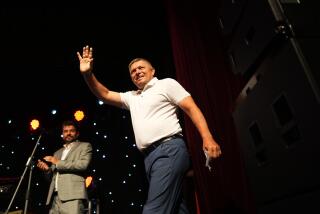Serbian Election Pits National Zealot Against U.S. Millionaire : Few expect mastermind of the Yugoslav tragedy would accept ouster with grace.
- Share via
BELGRADE, Yugoslavia — It boils down to a contest between a nationalist zealot who has sparked Europe’s deadliest war in half a century and a gregarious U.S. millionaire who promises peace and reconciliation with the West. Still, Sunday’s election for Serbian president will be close.
The fate of millions hangs on the outcome of this imperfect, unpredictable vote, as the Balkan war that has already killed tens of thousands threatens now to spread south.
Moderate federal Prime Minister Milan Panic has a slight lead over Serbian strongman Slobodan Milosevic, according to Penn & Schoen, the New York polling firm hired by Panic’s campaign.
But incumbent Milosevic, blamed by the West for stirring the embers of ethnic hatred in the former Yugoslavia, retains control over police and security forces poised to provoke diversionary conflicts if their patron should lose.
Political observers are divided in their predictions of how Milosevic would handle defeat. Most have little expectation that the mastermind of the Yugoslav tragedy would accept ouster with grace.
“He can impose a dictatorship if he doesn’t get what he wants otherwise,” said Zoran Djindjic, campaign manager for the Democratic Party, part of the opposition alliance backing Panic.
Milos Vasic, a prominent Belgrade commentator who has remained above the virulent nationalism infecting his fellow Serbs, likewise predicts violence if Panic manages to win.
“He will try to rock the boat in Kosovo, which is extremely dangerous,” Vasic said of Milosevic.
Serbia’s Kosovo province, where ethnic Albanians make up 90% of the population, is on the verge of explosion following three years of martial law imposed by heavily armed Serbian police deployed by Milosevic.
War in Kosovo would quickly spread throughout the Balkans because Albanians in neighboring countries would come with arms to the Kosovans’ defense.
A Milosevic victory, while less dangerous in the short run, would scuttle any moves to cure the Yugoslav economy, which suffers six-digit inflation, at least 30% unemployment and looming industrial collapse.
It might also spur Western countries to abandon hopes that Belgrade will cease bankrolling violence in Bosnia-Herzegovina, intensifying pressure for military intervention to prevent further spread of the war.
Undermining the chances of a good turnout, which would favor Panic, is the refusal of Yugoslavia’s 2 million Albanians--20% of the population--to take part in the balloting in protest of the repressive conditions under which they live.
Panic has campaigned enthusiastically, drawing tens of thousands in the northern cities of Belgrade, Nis, Novi Sad and Subotica. But Milosevic’s stronghold is in the rural south, and voters there are less smitten with the transplanted American challenger.
“The majority here hates Panic. They see him as having brought about a lot of fighting and arguing. He’s an American, and he’s seen as working for them, not us,” said 20-year-old Velica Bogdanovic, an unemployed textile worker from central Serbia.
Milosevic has stumped with a strategy of convincing voters that Panic is an agent of the Western powers that have wrongly punished Serbs with brutal sanctions.
“Those who introduced (sanctions) want to bring a puppet government which will work under the orders of big powers,” Milosevic told a cheering crowd in Krusevac on Tuesday.
The election will also seat parliaments in Serbia and in the rump Yugoslavia--now down to the republics of Serbia and Montenegro--whose composition will determine just how much latitude the president will have to change the system. Both bodies are currently dominated by Milosevic’s Serbian Socialist Party.
More to Read
Sign up for Essential California
The most important California stories and recommendations in your inbox every morning.
You may occasionally receive promotional content from the Los Angeles Times.











